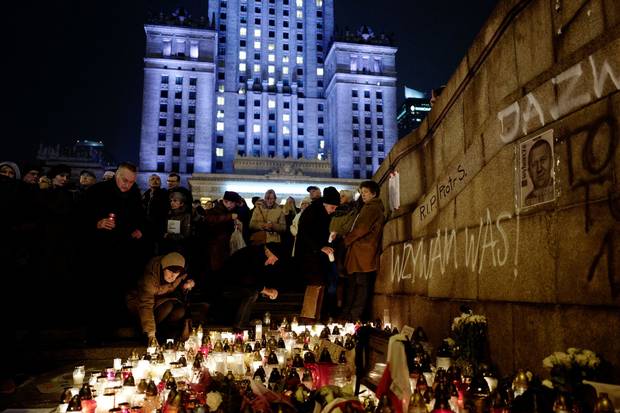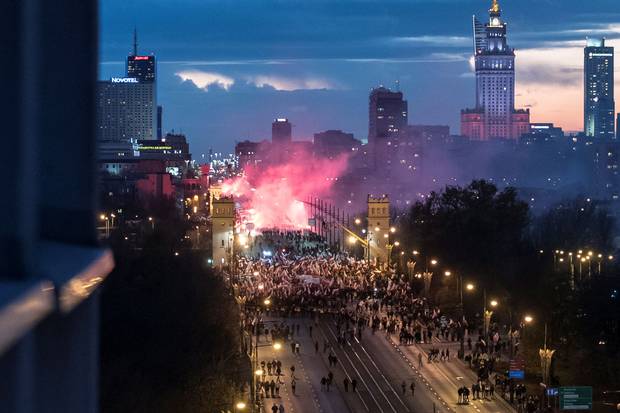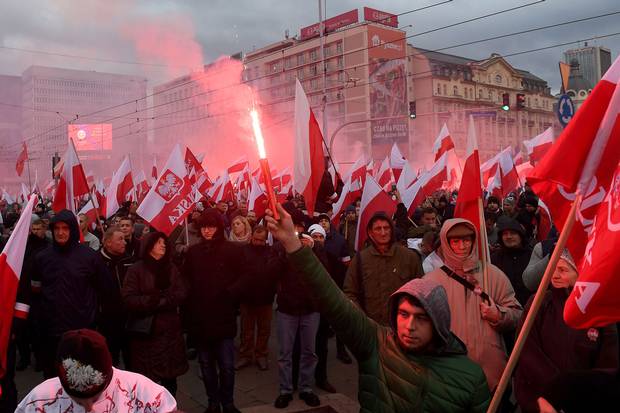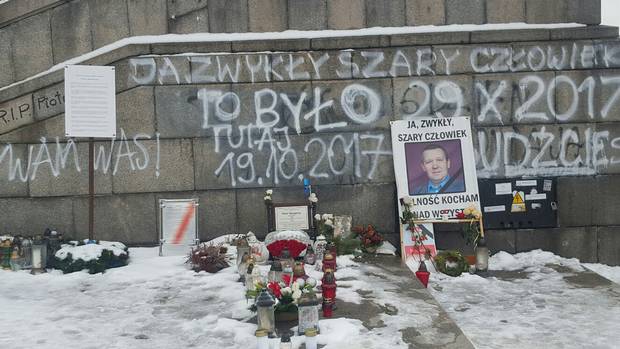Rows of candles and bundles of half-dead flowers are still stuck in the snow on the steps outside Warsaw's Palace of Culture and Science. Just above them on a brick wall hangs a large photograph of Piotr Szczesny, surrounded by graffiti quoting his final words: "I'm an ordinary, gray man. I am calling to you. Wake up!"
It was on this spot next to a busy downtown bus stop where Mr. Szczesny, a 54-year old chemist with a wife and two children, launched a one-man protest during the afternoon rush hour on a fall day last year.
Standing with a bullhorn and a stack of leaflets, Mr. Szczesny denounced Poland's populist government, accusing the ruling Law and Justice Party of trampling on human rights, gagging the media and using the police to maintain its hold on power.
Then he pulled out a canister of gasoline, poured it over his head and lit himself on fire. As a small crowd tried to put out the flames, Mr. Szczensy's leaflets, with his neatly written list of concerns, fluttered to the ground.
Mr. Szczesny died a few days later in hospital and news of his dramatic demonstration quickly faded. The government denounced him as deranged and three weeks after he died, Warsaw's streets were filled with more than 60,000 people marching in an Independence Day parade organized by far-right groups that included chants of "pure Poland, white Poland" and banners decrying Islam, immigrants and homosexuals.
Several Law and Justice members of Parliament joined the march, and the Minister of Interior, Mariusz Blaszczak, later called it "a beautiful sight."

Nov. 6, 2017: People gather and lay candles in the place where Piotr Szczesny killed himself. They hold papers reading ‘I, the everyman.’
KACPER PEMPEL/REUTERS

Nov. 11, 2017: Far-right groups organize a rally in Warsaw for Poland’s Independence Day celebrations.
AGENCJA GAZETA/FRANCISZEK MAZUR/REUTERS
There is not much room for political opposition in Poland these days as the country embraces the social conservatism of Law and Justice that is transforming nearly every aspect of society and sending shock waves across Europe. Few Europeans saw this coming and most find it hard to fathom that a country such as Poland – once considered a prosperous and progressive darling of the European Union – could drift so quickly toward populist authoritarianism.
Fewer still can comprehend that it is Poland that has become the first EU member state to face possible suspension from the union because of its government's anti-democratic drift. Or that after Brexit, Poland is the biggest challenge facing the bloc. With populist sentiments still prevalent across parts of Europe, Poland is a crucial test for how the EU responds to what it sees as a major threat to its democratic foundation.
"The overall picture is pretty bad, I'm afraid," said Rafal Pankowski, an associate professor of sociology at Warsaw's Collegium Civitas and co-founder of an anti-racism group called Never Again. The organization has seen the incidence of hate crimes soar from a few per week to several a day, with many targeting visible minorities, homosexuals and even people who just look slightly dark. Prof. Pankowski says Law and Justice has created a climate where extremism is socially accepted. "I think it will take many years to undo the damage that was done in the last two or three years in terms of the social climate of xenophobia," he added.
And yet, the size of the annual Independence Day march has been growing every year. Law and Justice's popularity has also been rising steadily since it won the 2015 election, touching 47 per cent a few months ago.
That is just fine with Mateusz Marzoch, a 24-year old student at the University of Warsaw who participated in the Independence Day march and proudly supports far-right groups, such as National Movement, one of the organizers. He especially welcomes the government's tough stand on immigration, defying the EU and refusing to take any of the millions of asylum seekers from Africa and the Middle East who have poured into Europe since 2015. Mr. Marzoch has lived in Sweden, but will not be going back, convinced that immigration has ruined that country.
"I think that all of the right-wing movements, and especially National Movement, care about Poland and Poles in a good way, and care about our national interests. Also they care about the tradition of our forefathers," he said adding that most of his friends feel the same.
Indeed, young Poles in particular have hardened their attitudes toward minorities and migrants. A poll of 1,000 people last year by Warsaw University's Centre for Research on Prejudice found that 37 per cent of those between the ages of 18 and 24 had a negative perception of Jews. That was the highest percentage of any age group in the survey, and it was an increase from 32 per cent in 2015. And nearly 90 per cent of young people were against Poland accepting migrants.
Many Polish observers say Law and Justice has simply exploited long-simmering social attitudes and a disgruntlement that had been building for years.

Nov. 11, 2017: Demonstrators burn flares and wave Polish flags during the Independence Day march in Warsaw. The size of the march has been growing every year, along with the popularity of the far-right Law and Justice party, since it won the 2015 election.
JANEK SKARZYNSKI/AFP/GETTY IMAGES
'It's about you'
On the surface, it seemed Poland never had it so good. After joining the EU in 2004, the country's economy soared, growing by 25 per cent between 2004 and 2015 and escaping the ravages of the financial crisis. During much of that period, Poland had liberal, pro-European governments led by Donald Tusk, who steered the country toward the mainstream of the EU. But many Poles were becoming dissatisfied. The benefits of EU membership had failed to trickle down to their level, and while the country boasted glimmering skyscrapers and better highways, real incomes had barely budged and more than two million Poles had left to find work in the West.
As the country headed for elections in 2015, that dissatisfaction was increasing. Suddenly, hundreds of thousands of migrants were streaming into Europe. The Polish government agreed with the EU to take in about 6,200 migrants, even though none had come into Poland. Many Poles balked, turning away from the moderation of the Tusk years and toward the populism of Law and Justice and its firebrand leader, Jaroslaw Kaczynski, a diehard nationalist who has long believed Poland strayed too far from its Catholic traditions.
Mr. Kaczynski, 68, has a deep history in Polish politics, but he was pushed to the sidelines during Mr. Tusk's years in power. He co-founded Law and Justice in 2001 with his twin brother, Lech, after years of alternating among conservative movements. The brothers cut their political teeth in the 1980s as members of the Solidarity trade union, which led the opposition to the pro-Soviet government of the day. After the Soviet Union collapsed in 1989, the Kaczynskis broke with Solidarity, convinced it had become corrupt and co-opted by former Communists who were still running the country. The brothers saw themselves as outsiders, criticizing the old Polish establishment and liberal elites, who they felt had lost touch with the masses. They led the party in 2005 into a coalition government that lasted barely two years, and Lech defeated Mr. Tusk in the presidential race that year. Lech died in a plane crash on April 10, 2010, leaving his brother devastated and in perpetual mourning, still wearing a black suit every day and attending a service in his honour on the 10th day of each month.
Mr. Kaczynski saw the 2015 migrant crisis as a defining moment, and led the charge against accepting any refugees in Poland. His anti-immigration stand found a receptive audience in a country that is virtually mono-ethnic and has almost no experience with multiculturalism. He also tapped into the economic disgruntlement, promising that a Law and Justice government would increase the minimum wage, lower the retirement age for pension eligibility and offer families with more than one child a monthly payment of 500 zlotys per child (or about $183). That kind of social benefit was almost unknown in Poland – and it won over scores of middle-class voters.
"Kaczynski told people: 'You are included. You are in. It's about you,'" said Slawomir Sierakowski, who heads a Warsaw think tank called Political Critique. "Kaczynski is not just a crazy, traditional idiot. It's the opposite. He represents for them a strong state."
In the 2015 election, Law and Justice swept to power, winning control of parliament and taking the presidency. It was the first time in Poland that a single party held every level of government.
Mr. Kaczynski remained in the background, serving as a backbench lawmaker and hand-picking others to carry out his nationalist vision. His ministers moved quickly. They revamped the bureaucracy and public media, kicking out scores of managers and installing party sympathizers as mouthpieces. They reorganized the school system to place more emphasis on "the values of fatherland, nation and state." They replaced dozens of judges with political appointees and introduced further judicial reforms to root out those who Mr. Kaczynski believed were corrupt Communist holdovers. They are phasing out Sunday shopping to promote family values and considering tightening the country's already strict abortion laws. Even some street names are being changed to promote national pride.
"We must try to consolidate Polish society at large along the lines of positive Polish traditions and values," Mr. Kaczynski told the Financial Times last year.
'Very, very scary'
For the EU, the radical shift has come as a jolt. Poland's refusal to take any migrants and the sweeping judicial reforms led to conflicts, especially with Mr. Tusk, who in 2014 became President of the European Council, which represents EU leaders. In December, the European Commission, the EU's executive arm, invoked Article 7 of the Treaty of Lisbon, a mechanism that allows the suspension of a country that violates the bloc's common values. The move could cost Poland its EU voting rights and jeopardize its EU funding. "This is not just about Poland, it is about the EU as a whole," Frans Timmermans, deputy head of the European Commission, said in explaining the unprecedented action. He cited the judicial reforms, which the EU has said will politicize Poland's judiciary and go against the bloc's founding principles. "If you put an end to, or limit, the separation of powers, you break down the rule of law – and that means breaking down the smooth functioning of the union as a whole," Mr. Timmermans said.
The Polish government has shown signs it might back down. In January, Mr. Kaczynski replaced prime minister Beata Szydlo with Mateusz Morawiecki, a former banker who had been financial minister. Mr. Morawiecki has shuffled the cabinet and ousted some hardliners. He has also denounced some recently reported hate crimes, insisting that there was "no place for racism in Poland."
Konrad Szymanski, Poland's Secretary of State for European Affairs, said the government hopes to resolve its issues with the EU, but he insisted Law and Justice will not pull back from its signature policies. That includes not accepting migrants.
"We believe that it is obviously against our beliefs, our approach," he said in an interview in the Polish foreign ministry office. The country has no "specific experience with co-existence, or co-operation, or any other experience with the Middle East … The liberal societies of the West already put the question how far we can accommodate the cultural differences?" As for the proposed judiciary changes, Mr. Szymanski said the government was simply trying to make the system more efficient and it will not interfere with judicial decision making.
He also rejected accusations that Poland has become more intolerant. "Of course, we have a very conservative government with a strong right-wing portfolio," he said. "But at the same time, it is [a program] based also on social solidarity. So it is a Polish version of conservatism."
Nonetheless, Mr. Kaczynski and his party face a tricky balancing act; while support for their nationalist agenda remains strong, Poles overwhelmingly want to remain in the EU. And if the party moves too far toward the centre to appease the EU, plenty of forces building on the right are ready to step in. They include a new anti-establishment movement led by former rock singer Pawel Kukiz, who has become a hero among many young voters and whose group won 42 seats in parliament. The Kukiz bloc has taken an even harder line on immigration, viewing not only Muslims as a threat, but also the mass influx of Ukrainians. And it is far more skeptical about the EU. "We want Poland to leave the EU," said Robert Winnicki, a lawmaker who was elected with the Kukiz group, but now sits as an independent and founder of the far-right National Movement.
Just 32 years old, Mr. Winnicki aims his message at a growing number of young voters, saying many have returned to Poland after working abroad fed up with what they saw in places such as Britain, Germany and France. "We can see, as the younger generation, what is going on in the West, and we don't like that," he said, sitting in his office in a ramshackle building in central Warsaw. "You have Muslims, you have migrants, you are not proud of yourself. So you are not an example for us."
That is frightening talk for people such as 24-year-old Marta Tondera, who works for an educational non-profit organization in Warsaw. She returned to Poland a few months ago from London, where she spent six years attending high school and university. She came back because of the strong economy and abundant jobs, although she still earns a fraction of what she made in Britain. And while she is glad to be home, she has had a hard time adjusting to the growing intolerance. "I'm not used to that, coming from London," she said. Last November, on Independence Day, she attended a small counter-demonstration against the right-wing marchers. She recalled watching some of the marchers, hearing their racist chants and seeing the anti-migrant banners.
"It was scary," she said. "Very, very scary."
EXPLAINER
Four things to know about Poland
1. Who's coming and who's going
Poland's population has held steady around 38 million for years. Since the country joined the EU in 2004, more than two million Poles have left. That has been partly made up by more than one million Ukrainians who have arrived since political turmoil began in their home country in 2014.
2. The economy is growing
Poland's economy has been among the fastest growing in Europe in the past 10 years, and it is now the largest economy in Central Europe and the eighth largest in the EU. Unemployment has fallen to 6.6 per cent, close to a record low.
3. Migrants
Poland has joined Hungary and the Czech Republic in defying the EU by refusing to take any asylum seekers. The EU has retaliated by suing all three governments in the European Court of Justice. Poland also faces possible EU suspension over its judicial reforms.
4. East vs. West
Poland's Law and Justice government is hostile to Russia, and it plans to boost military spending to 2.1 per cent of gross domestic product by 2020 and 2.5 per cent by 2030. Poland is one of only five North Atlantic Treaty Organization countries that meet the alliance's target of spending 2.0 per cent of GDP on defence.
EUROPE AND BEYOND: MORE FROM THE GLOBE AND MAIL






